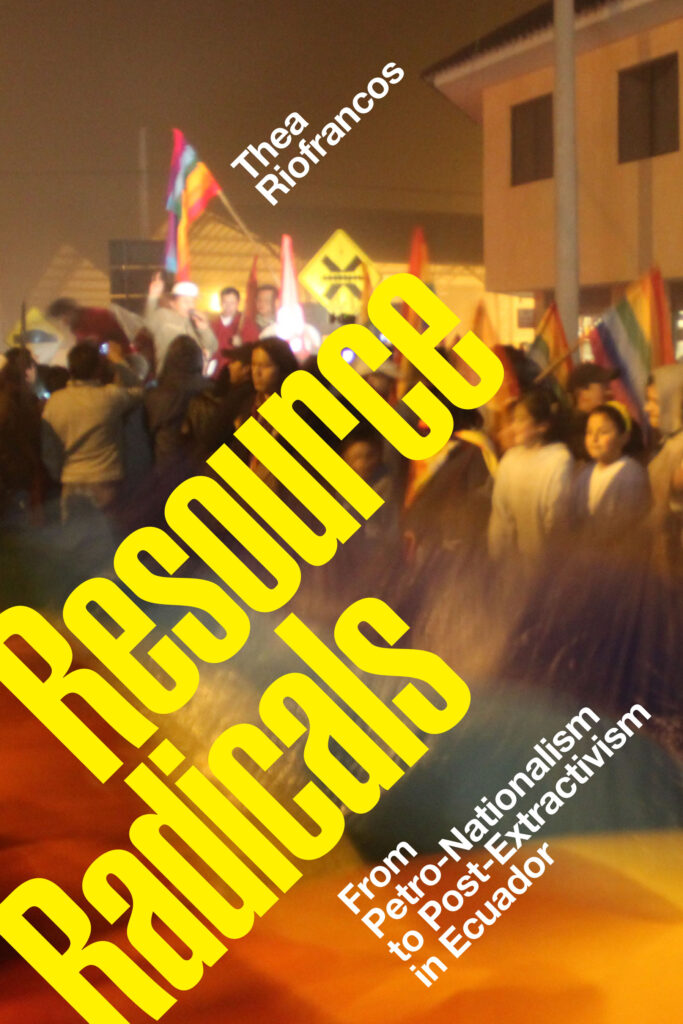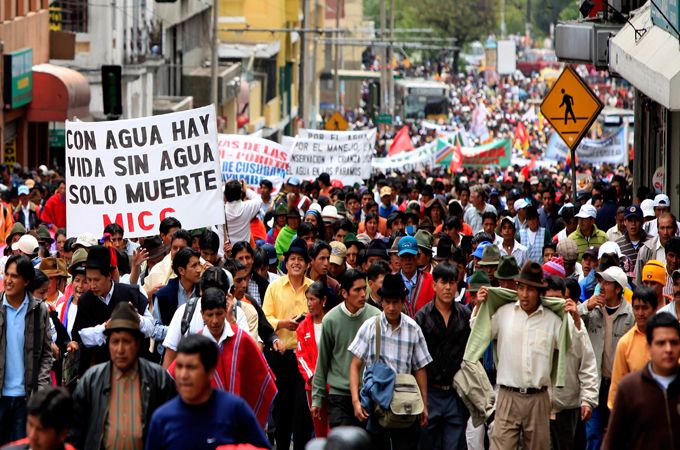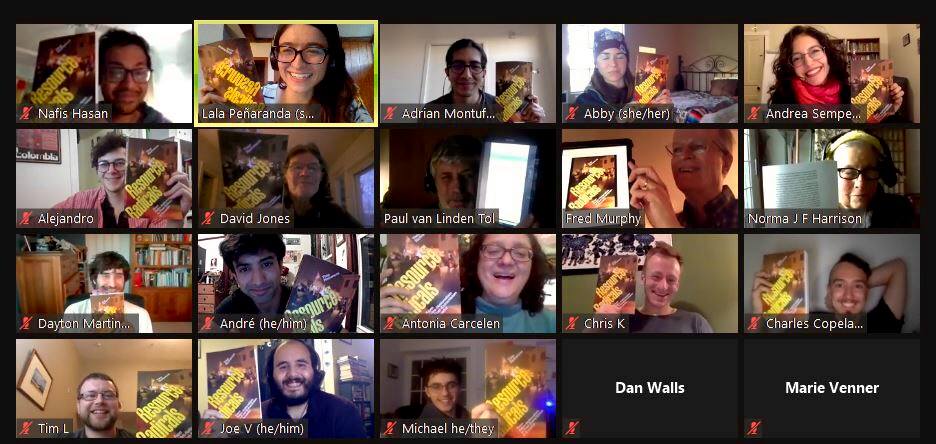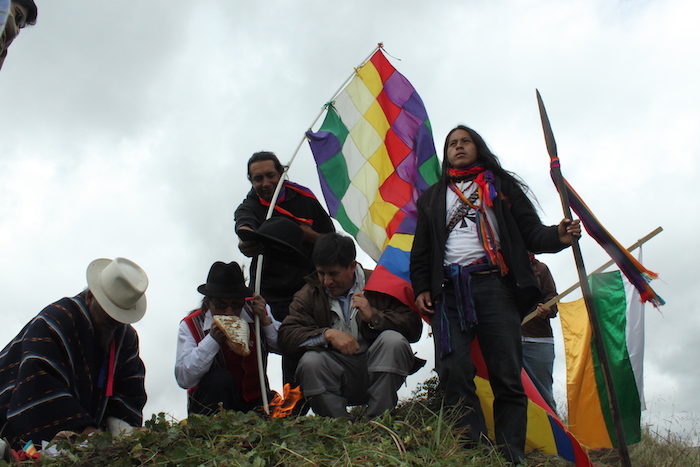 Between January and April 2021, Science for the People co-organized a reading group along with DSA Ecosocialists and The Dig podcast of Thea Riofranco’s “Resource Radicals: From Petro-Nationalism to Post-Extractivism in Ecuador,” a thoughtful and generous analysis of the history and politics of ongoing dynamic debates within the diverse Ecuadorian lefts. If you would like to organize future reading groups with Science for the People, please contact us at sftp.revitalization[at]gmail.
Between January and April 2021, Science for the People co-organized a reading group along with DSA Ecosocialists and The Dig podcast of Thea Riofranco’s “Resource Radicals: From Petro-Nationalism to Post-Extractivism in Ecuador,” a thoughtful and generous analysis of the history and politics of ongoing dynamic debates within the diverse Ecuadorian lefts. If you would like to organize future reading groups with Science for the People, please contact us at sftp.revitalization[at]gmail.
Below we have done our best to summarize some of the take-aways of the reading group experience in three sections:
1. Guiding/Discussion questions
2. Reading group reflections
3. Supplemental reading and materials
GUIDING/DISCUSSION QUESTIONS

Session 1: Introduction + Chapter 1 (From Neoliberalismo to Extractivismo)
- How did anti-extractivism emerge as a political demand to organize around under a Left government in power?
- What are the central tensions between the left in power and the left on the streets? Do these tensions still play out in current day Americas (both North and South)? If yes, how so?
- What is the “extractive model” and what are its trappings for an ascendent Leftist movement? What have been its concrete achievements? What were the alternative means proposed for similar objectives by the anti-extractivist left?
- Was resource nationalism a definitive break from neoliberalism? Discuss your arguments (for/against) within the context of global capital.
Session 2: Chapter 2 (Extractivismo as Grand Narrative of Resistance)
- How does extractivismo as an organizing principle differ from the mainstream environmental movement in the Global North? Are there any similar principles in the Global North? If not, how can organizers/activists raise such a consciousness?
- Discuss the technocratic framing of a neoliberal state as “weak” and “inefficient” as compared to a socialist “regulatory” state – how does this framing compare with the conception of an anti-capitalist state? How does this framing compare with actually existing socialist states such as Cuba and the USSR?
- What functions did bureaucrats like Maria Belen serve in the Correa administration? How did their roles influence the tensions between the anti-extractivist activists and the Correa govt?
- How does the dichotomy of anti-extractivism vs resource nationalism play out in terms of anti-imperialist politics?
Session 3: Chapter 3 (Consulta Previa)
- Where did Ecuador’s 2008 Constitution originate from and how did it shape the coming battles between anti-extractive activists and the government
- What lessons can be learned from Ecuadorean activists practicing constituent politics and how can they be applied to local environmental fights in the Global North, especially the US and/or Canada?
- In Abel Arpi’s formulation of state ownership of non-renewable resources and anti-extractivism, is there room for developmentalism? Discuss Arpi’s proposal as a path towards wielding state power for socialist goals.
- Are there parallels to the use of 1040 Decree by government bureaucrats, such as in the Mirador project, to the use of information by US governments when justifying extractive operations?
Session 4: Chapter 4 (The Demos in Dispute)
- How did the question around the Quimsacocha gold mine bring up the question of who “the people” are? How did the idea of “the people” differ in the communities compared to that held by state functionaries?
- What role did plurinationality, as incorporated in the 2008 constitution, play in shaping the exercise of constituent power by UNAGUA members?
- What risks underlie the use of democratic exercises as resistance?
- In a socialist state, can a national interest ever be fully aligned with local interests?
Session 5: Chapter 5 (Governing the Future)
- Does the dichotomy of Left-in-Power vs the Left-in-Resistance serve a useful lens to view future socialist politics? Discuss why or why not.
- How can questions of national sovereignty be resolved in a plurinational state?
- Within radical resource nationalism, is there room for internationalist solidarity?
- Given the short window of time to enact meaningful changes to combat the climate crisis, which is planetary in nature, how can the Left-in-Power vs the Left-in-Resistance dialectic be resolved?
Session 6: Chapter 6 (Conclusion)
- Does the dichotomy of Left-in-Power vs the Left-in-Resistance serve a useful lens to view future socialist politics? Discuss why or why not.
- How can questions of national sovereignty be resolved in a plurinational state?
- Within radical resource nationalism, is there room for internationalist solidarity?
- Given the short window of time to enact meaningful changes to combat the climate crisis, which is planetary in nature, how can the Left-in-Power vs the Left-in-Resistance dialectic be resolved?
READING GROUP REFLECTIONS

- Quote – Coming Soon
- Quote – Coming Soon
- Quote – Coming Soon
SUPPLEMENTAL READING + MATERIALS

